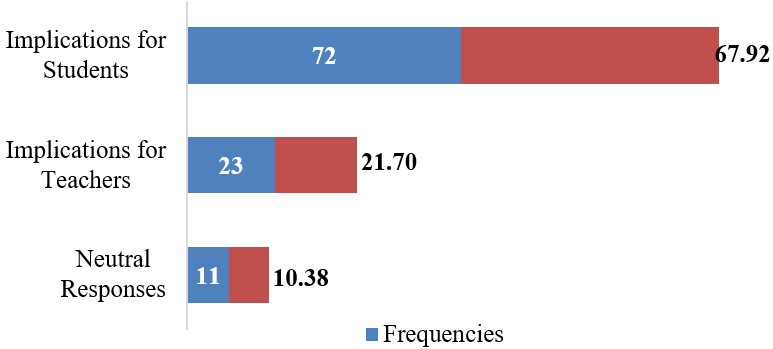The Importance of Writing Scoring Rubrics for Saudi EFL Teachers
Abstract
This mixed-method study explored the perspectives of Saudi EFL teachers concerning the use of Writing Scoring Rubrics (WSRs) to correct students' written work and instruct EFL writing classes. The study sample included 106 Saudi EFL teachers, who answered the twenty-one close-ended questions and the first open-ended question, with twenty-five answering the second open-ended question. The findings reveal that the teachers frequently employed in-class correction and feedback to correct their students' written work, with nearly one-third used assessment techniques that included WSRs, self-assessment, peer editing, journals, and portfolios. The results of the second question indicate that Saudi EFL teachers generally engage students in creating customized WSRs. The findings also revealed that Saudi EFL teachers consider WSRs beneficial to both students and teachers and might be viewed by some experienced EFL teachers as a practical correction or assessment method that improves students' writing. Therefore, this study contributes to a growing body of literature highlighting the importance of WSRs in teaching and assessing writing skills.
Downloads
References
Ahmed, F. (2019). Errors of unity and coherence in Saudi Arabian EFL university students' written paragraph: A case study of College of Science and Arts, Tanumah, King Khalid University, Kingdom of Saudi Arabia. European Journal of English Language Teaching, 4(3), 125-155. https://doi.org/10.5281/zenodo.321555
Aldukhayel, D. M. (2017). Exploring students' perspectives toward clarity and familiarity of writing scoring rubrics: The case of Saudi EFL students. English Language Teaching, 10(10), 1-9. https://doi.org/10.5539/elt.v10n10p1
Alshakhi, A. (2018). Revisiting the writing assessment process at a Saudi English language institute: Problems and solutions. English Language Teaching, 12(1), 176-185. https://doi.org/10.5539/elt.v12n1p176
Alshammari, S. (2020). "Writing to learn or learning to write". A critical review of "English as a foreign language" (EFL) teaching practices in writing in Saudi Universities. Research in Education and Learning Innovation Archives, 24, 1-22. https://doi.org/10.7203/realia.24.15867
Alzamil, A. (2020). An investigation of writing errors made by Saudi English-major students. International Journal of English Linguistics, 10(2), 92-97. https://doi.org/10.5539/ijel.v10n2p92
Anh, D. T. (2019). EFL student's writing skills: Challenges and remedies. IOSR Journal of Research & Method in Education, 9(6 Ser. I.), 74-84. https://doi.org/10.9790/7388-0906017484
Ansari, A. A. (2012). Teaching of English to Arab students: Problems and remedies. Educational Research, 3(6), 519-524. Retrieved from http://www.interesjournals.org/ER
Anwar, M., & Ahmed, N. (2016). Students' difficulties in learning writing skills in second language. Science International (Lahore), 28(4), 735-739.
Becker, A. (2016). Student-generated scoring rubrics: Examining their formative value for improving ESL students' writing performance. Assessing Writing, 29, 15-24. https://doi.org/10.1016/j.asw.2016.05.002
Bradford, K. L., Newland, A. C., Rule, A. C., & Montgomery, S. E. (2016). Rubrics as a tool in writing instruction: Effects on the opinion essays of first and second graders. Early Childhood Education Journal, 44, 463-472. https://doi.org/10.1007/s10643-015-0727-0
Chan, Z., & Ho, S. (2019). Good and bad practices in rubrics: The perspectives of students and educators. Assessment and Evaluation in Higher Education, 44(4), 533-545. https://doi.org/10.1080/02602938.2018.1522528
Chowdhury, F. (2018). Application of rubrics in the classroom: A vital tool for improvement in assessment, feedback and learning. International Education Studies, 12(1), 61-68. https://doi.org/10.5539/ies.v12n1p61
Creswell, J. W. (2012). Educational research: Planning, conducting, and evaluating quantitative and qualitative research. In Nursing Research. Pearson Education, Inc. https://doi.org/10.4324/9781315092171-19
Fareed, M., Ashraf, A., & Bilal, M. (2016). ESL learners' writing skills: Problems, factors and suggestions. Journal of Education & Social Sciences, 4(2:1), 83-94. https://doi.org/10.20547/jess0421604201
Gulzar, M. A., Buriro, G. A., & Charan, A. A. (2017). Investigating the effects of rubrics on assessment of writing tasks. International Research Journal of Arts & Humanities (IRJAH), 45(45), 191-206.
Ibnian, S. S. (2017). Writing difficulties encountered by Jordanian EFL learners. Asian Journal of Humanities and Social Studies, 05(03), 2321-2799. Retrieved from http://www.ajouronline.com
Ibrahim, N., & Nambiar, R. (2011). What is the problem with the statement of problem?: The case of postgraduate international students and the introductory sections of a project paper. Procedia - Social and Behavioral Sciences, 15, 1713-1717. https://doi.org/10.1016/j.sbspro.2011.05.092
Jashari, L. T. & Fojkar, M. D. (2019). Teachers' perceptions of developing writing skills in the EFL classroom. English Language and Literature Teaching, 16(2), 77-90. https://doi.org/10.4312/elope.16.2.77-90
Javid, C., & Umer, M. (2014). Saudi EFL learners' writing Problems: A move towards solution. Proceeding of the Global Summit on Education GSE 2014 (E- ISBN 978-967-11768-5-6) 4-5 March 2014, Kuala Lumpur, MALAYSIA., 164-180. WorldConferences.net%0A164
Jeong, H. (2015). Rubrics in the classroom: Do teachers really follow them? Language Testing in Asia, 5(6), 1-14. https://doi.org/10.1186/s40468-015-0013-5
Karim, S., Maasum, T., & Latif, H. (2017). Writing challenges of Bangladeshi tertiary level EFL learners. Journal of Social Sciences and Humanities, 12(2), 296-306.
Kenta, A. E., & Bosha, T. B. (2019). An investigation into factors that affect students' writing skills: The case of Sodo secondary school. English Language, Literature & Culture, 4(2), 54-60. https://doi.org/10.11648/j.ellc.20190402.14
Ketabi, S. (2015). Different methods of assessing writing among EFL teachers in Iran. International Journal of Research Studies in Language Learning, 5(4), 1-14. https://doi.org/10.5861/ijrsll.2015.1161
Kulprasit, W. (2016). EFL students' attitudes toward authentic and formative assessment: The role of writing rubric. International Journal of Languages, Literature and Linguistics, 2(1), 32-37. https://doi.org/10.18178/ijlll.2016.2.1.63
Kulprasit, W. (2017). Writing rubric and three types of reflective writing feedback: students' attitude boosters. The European Proceedings of Social and Behavioural Sciences, 95-105. https://doi.org/10.15405/epsbs.2019.09.10
Larkin, T. L. (2015). A rubric to enrich student writing and understanding. International Journal of Engineering Pedagogy (IJEP), 5(2), 12. https://doi.org/10.3991/ijep.v5i2.4587
Mahmoudi, F., & Buğra, C. (2020). The effects of using rubrics and face to face feedback in teaching writing skill in higher education. International Online Journal of Education and Teaching, 7(1), 150-158. Retrieved from http://iojet.org/index.php/IOJET/article/view/693
Mohammad, T., & Hazarika, Z. (2016). Difficulties of learning EFL in KSA: Writing skills in context. International Journal of English Linguistics, 6(3), 105-117. https://doi.org/10.5539/ijel.v6n3p105
Mohammed, O., & Alshenqeeti, H. (2020). E-journaling and Writer's Workshop as Writing Scaffolding Techniques in Saudi EFL Classes. Sohag University Journal of Education, 76, 37-58. https://doi.org/10.21608/edusohag.2020.103381
Moses, R. N., & Mohamad, M. (2019). Challenges faced by students and teachers on writing skills in ESL contexts: A literature review. Creative Education, 10(13), 3385-3391. https://doi.org/10.4236/ce.2019.1013260
Moskal, B. M. (2000). Scoring rubrics: What, when and how? Practical Assessment, Research and Evaluation, 7(3), 1-5. https://doi.org/10.7275/a5vq-7q66
Narvaez, M., Salas, E., Basantes, E., Rodriguez, N., & Escobar, M. (2019). Rubrics and academic performance in English as a foreign language teaching: Assessing writing tasks. European Scientific Journal ESJ, 15(17), 46-60. https://doi.org/10.19044/esj.2019.v15n17p46
Neuman, W. L. (2014). Social research methods: Qualitative and quantitative approaches. In Teaching Sociology (7th ed.). Pearson Education Limited. https://doi.org/10.2307/3211488
Ningsih, S. (2016). Guided writing to improve the students' writing ability of junior high school students. EFL Journal, 1(2), 129-140. https://doi.org/10.21462/eflj.v1i2.12
Nuruzzaman, M., Islam, S., & Shuchi, I. J. (2018). An analysis of errors committed by Saudi non-English major students in the English paragraph writing: A study of comparisons. Advances in Language and Literary Studies, 9(1), 31-39. https://doi.org/10.7575/aiac.alls.v.9n.1p.31
Onchera, P. O. & Manyasi, B. N. (2013). Functional writing skills for effective communication: The English language classroom in Kenya. Journal of Emerging Trends in Educational Research and Policy Studies (JETERAPS), 4(6), 842-847.
Qasim, A., & Qasim, Z. (2015). Using rubrics to assess writing: Pros and cons in Pakistani teachers' opinions. Journal of Literature,Languages and Linguistics, 16, 51-58. Retrieved from http://www.iiste.org/Journals/index.php/JLLL/article/viewFile/27152/27835
Rass, R. A. (2015). Challenges face Arab students in writing well-developed paragraphs in English. English Language Teaching, 8(10), 49-59. https://doi.org/10.5539/elt.v8n10p49
Ridha, N. S. (2012). The effect of EFL learners' mother tongue on their writings in English: An error analysis study. Journal of the College of Arts. University of Basrah No, 60, 22-45.
Rini, R., & Purnawarman, P. (2018). Teachers' perception toward planning and implementing teacher-made rubrics of EFL students' writing assessment. Advances in Social Science, Education and Humanities Research, Volume 254 Eleventh Conference on Applied Linguistics (CONAPLIN 2018), 361-364. https://doi.org/10.2991/conaplin-18.2019.176
Setyowati, L., & Sukmawan, S. (2016). EFL Indonesian students' attitude toward writing in English. Arab World English Journal, 7(4), 365-378. https://doi.org/10.2139/ssrn.2898636
Sharma, V. (2019). Teacher perspicacity to using rubrics in students' EFL learning and assessment. Journal of English Language Teaching and Applied Linguistics, 1(1), 16-31.
Tseng, C. T. H. (2018). Delayed effect of teachers' error correction on EFL students' ability in self-correction in writing: A case study. International Journal of Language & Linguistics, 5(4), 159-165. https://doi.org/10.30845/ijll.v5n4p20
Turgut, F., & Kayaoğlu, M. (2015). Using rubrics as an instructional tool in EFL writing courses. Journal of Language and Linguistic Studies, 11(1), 47-58. Retrieved from http://www.jlls.org/index.php/jlls/article/view/4/5


This work is licensed under a Creative Commons Attribution 4.0 International License.
Copyright for this article is retained by the author(s), with first publication rights granted to the journal.
This is an open-access article distributed under the terms and conditions of the Creative Commons Attribution license (http://creativecommons.org/licenses/by/4.0/).









1.png)









1.png)











